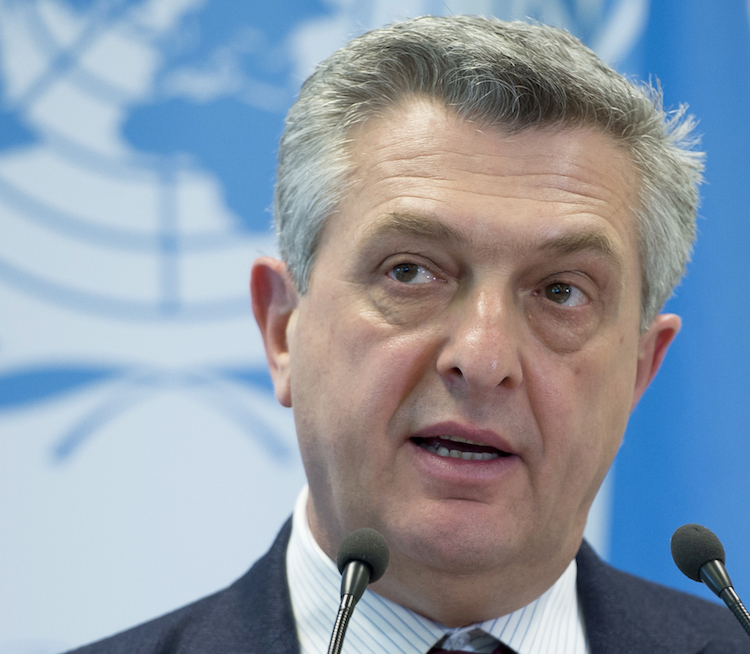By Phil Harris
ROME (IDN) – Newly-elected US president Donald Trump has been hyperactive in his first week in office, signing executive orders that confirm his pre-election pledges to “make America great again” by brushing aside any concern for the plight of those seeking to find safety and a better life.
One of his first acts was the signing of an executive order to begin the process of building a wall on the US-Mexico border, saying that “a nation without borders is not a nation. Beginning today, the United States of America gets back control of its borders, gets back its borders.”
But it was on January 27, when he ordered suspension of the US refugee programme for 120 days and the barring of entry to the United States for refugees from seven mostly Muslim countries until further notice, that national and international indignation took off.
Adding its voice to protests throughout the United States, UNHCR – the UN refugee agency – diplomatically expressed concern about the uncertainty facing thousands of refugees around the world who are in the process of being resettled to the United States.
According to Filippo Grandi, UN High Commissioner for Refugees, an estimated “20,000 refugees in precarious circumstances might have been resettled to the United States during the 120 days covered by the suspension … based on average monthly figures for the last 15 years” but now “refugees are anxious, confused and heartbroken at this suspension in what is already a lengthy process.”
Grandi said that “refugees share the very same concerns about security and safety that Americans have. They themselves are fleeing war, persecution, oppression and terrorism. The individuals and families UNHCR refers to governments for resettlement are the most vulnerable – such as people needing urgent medical assistance, survivors of torture, and women and girls at risk. The new homes provided by resettlement countries are life-saving for people who have no other options.”
The International Organization for Migration (IOM) joined UNHCR on January 28 in issuing a joint statement expressing “hope that the United States will continue its strong leadership role and long tradition of protecting those who are fleeing conflict and persecution.”
Stressing that “the needs of refugees and migrants worldwide have never been greater, and the US resettlement programme is one of the most important in the world”, the two agencies noted that “the long-standing US policy of welcoming refugees has created a ‘win-win’ situation.
“It has saved the lives of some of the most vulnerable people in the world who have in turn enriched and strengthened their new societies. The contribution of refugees and migrants to their new homes worldwide has been overwhelmingly positive.”
UNHCR and the IOM also expressed the strong belief that “refugees should receive equal treatment for protection and assistance, and opportunities for resettlement, regardless of their religion, nationality or race.”
However, the opinions of UN agencies on his immigration policy are unlikely to move Trump, who has already shown that he has little respect for the United Nations as a whole.
On December 28, while he was still President-elect and just two days after attacking the United Nations as being “just a club for people to get together, talk and have a good time”, Trump continued his criticism of the global body saying that the organisation was causing problems rather than solving them and that it will be “a waste of time and money” if it does not start living up to its potential.
While not saying outright that the United States should withdraw from the United Nations, there are reports that the Trump administration might be considering drastic cuts in its funding of the organisation.
In an opinion piece published by The Guardian on January 27, Howard Stoffer, a former Deputy Executive Director in the UN Security Council, said that “according to some reports, there exist draft executive orders reducing US funding to the United Nations and other international organisations by at least 40 percent overall. That would reshape the organisation, whose aim is world peace and international cooperation, unalterably.”
Meanwhile, Trump has already shown how he will react to criticism of his actions by firing acting US Attorney General Sally Yates on January 30 after she told US Department of Justice lawyers not to defend his executive order banning entry for people from seven Muslim-majority countries.
According to a White House statement, Yates had “betrayed” the department by refusing to enforce a legal order that was “designed to protect the citizens of the United States”.
Yates, who was appointed by Barack Obama, had control over the immigration litigation office of the Department of Justice, which has handled federal complaints filed against Trump’s order since his immigration policy was announced.
Yates told Department of Justice lawyers that she was “responsible for this institution’s solemn obligation to always seek justice and stand for what is right … At present I am not convinced that the defence of the executive order is consistent with these responsibilities nor am I convinced that the executive order is lawful.”
Yates may not be convinced but there are growing numbers who are convinced that Trump’s retrograde chauvinism sounds a warning for human rights. [IDN-InDepthNews – 31 January 2017]
Photo: “Refugees share the very same concerns about security and safety that Americans have.” Filippo Grandi, UN High Commissioner for Refugees. Credit: UN Photo/Jean-Marc Ferré.
IDN is flagship agency of the International Press Syndicate.

